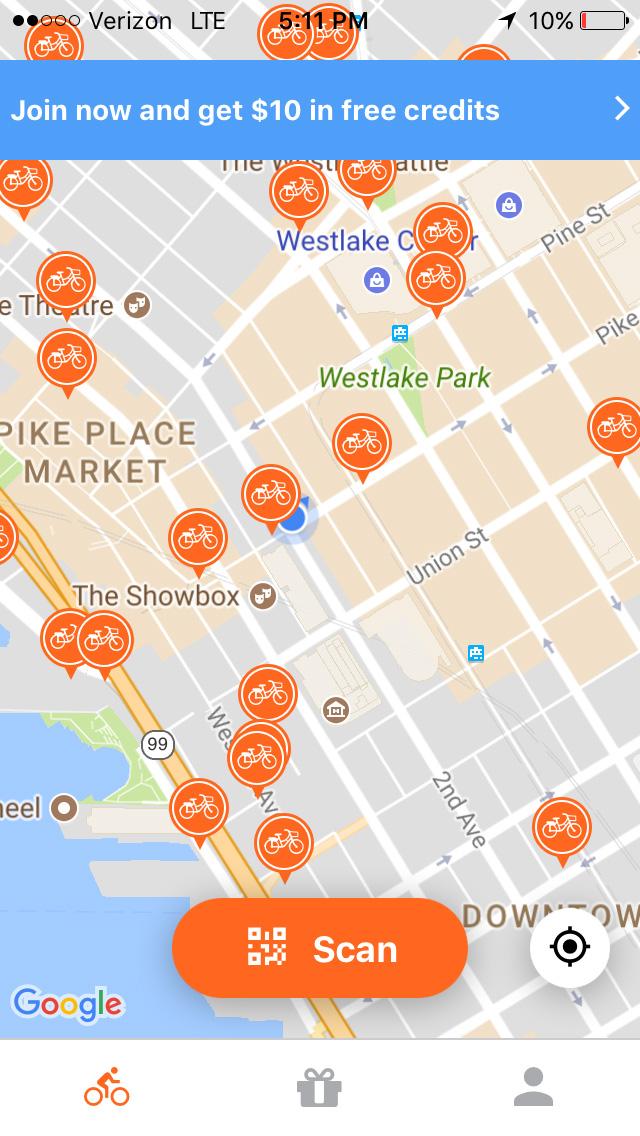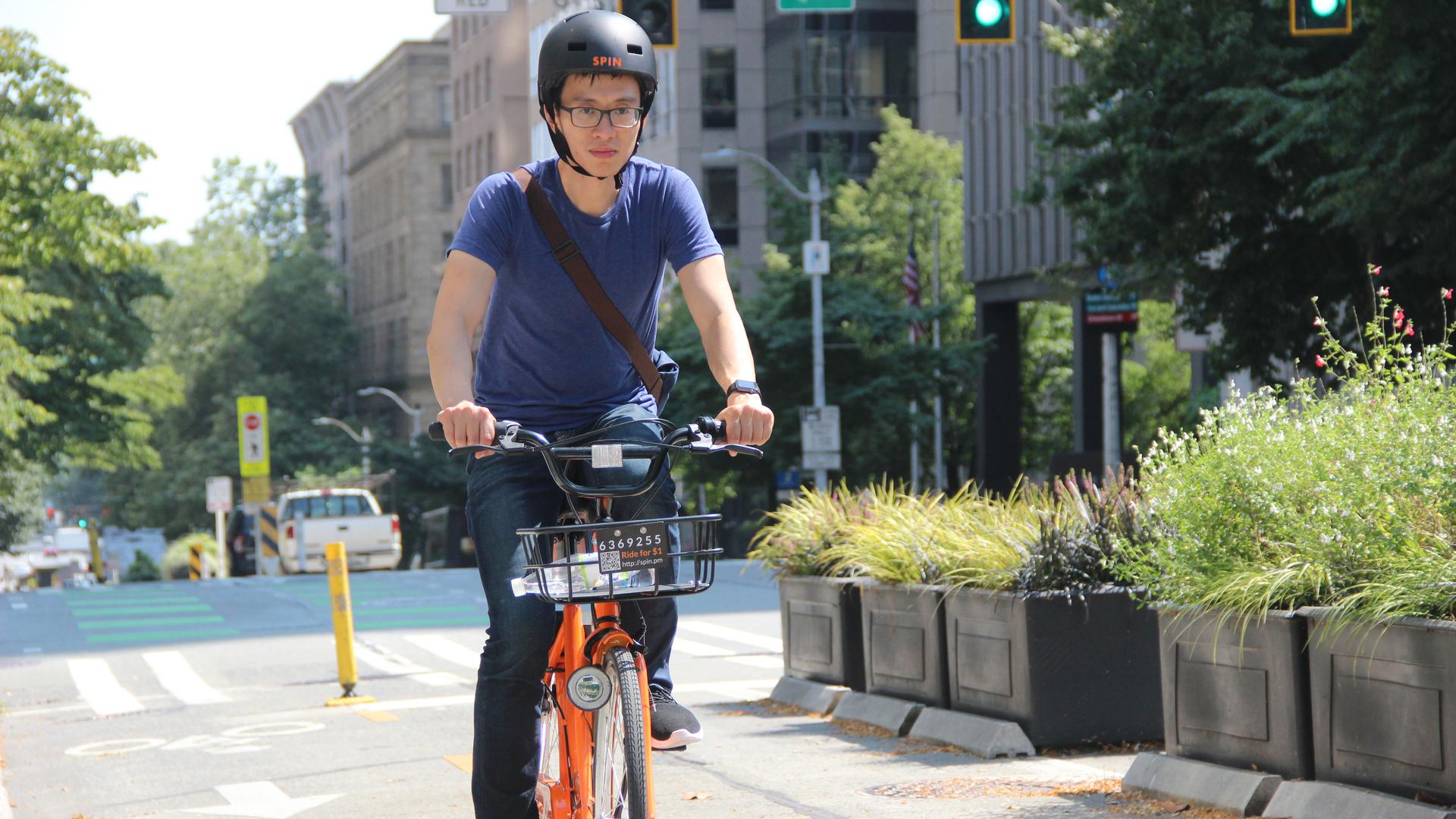Seattle becomes first US city to try dockless bike sharing, the system that’s transforming China
Derrick Ko, co-founder and CEO of Spin, rides one of his bikes in downtown Seattle. Spin currently has a permit to place 500 ride-share bikes in the city.
President Donald Trump has been trying to unravel a lot of President Barack Obama’s legacy. That now includes dismantling a small part of Washington, DC's growing bike-sharing program. A bicycle dock was placed inside the White House grounds in 2010, but the Trump administration had it removed last week.
In Seattle, they're trying out something completely new for American cities: dockless bike sharing. You rent a bike by the half-hour, and when you’re done, you get off and lock it wherever your ride ends. It might be a new concept for Americans, but the idea isn’t all that innovative — it’s huge in China.
Seattle recently had a bike-sharing program called Pronto, but it didn’t work so well — it lasted 2 1/2 years before it went under in March. Seattle’s hills and rain didn’t help, but Tom Fucoloro, the founder of Seattle Bike Blog, said the real culprit was the system.
“It was hard to make use of it. It was rarely where you were and where you were trying to go to,” said Fucoloro.
The bike-sharing program was also controversial because the city bailed out a failing nonprofit enterprise. This time, Seattle is trying bike sharing with no taxpayer money and no docks — the stations where you find and return a bike. The new dockless system got off to a hot start — more than 15,000 rides in the first week, immediately eclipsing the old system’s best week ever.
“We’re about to see a real transportation revolution in this city,” said Fucoloro. “Huge, huge increase in the number of trips being taken by bicycle.”
Two Bay Area startups — Spin and LimeBike — have each sprinkled 500 bright green and orange bikes throughout Seattle’s downtown sidewalks.
It’s quickly getting competitive. The Chinese company, Ofo, which bills itself as the world’s largest stationless bike-sharing company, also just received a Seattle city permit to add 1,000 yellow bikes into the mix.
“Just a dollar per 30 minutes, you can download our app, add your payment information, scan any bike that you see on the street, and it will automatically unlock and you can start riding,” Derrick Ko, the 31-year-old co-founder of Spin, told me.

We took out our phones and a map showed us about 25 Spin bikes, the orange ones, within a few blocks. We walked a half-block and found a bright orange bike parked on the sidewalk. I scanned a code on the back of the bike and moments later … click. The back tire unlocked and we were off, riding through Seattle, happy as can be.
Then, when we reached our destination, we just locked the back tires manually and left the bikes parked right out front on the sidewalk. The system was easy and convenient, and the bikes were nice, too. (I only rode a Spin bike, but LimeBikes looked solid, as well.)
This concept, dockless bike sharing, has exploded in China over the past two years.
“Now, there are literally millions of these bicycles on the streets in China. And it has really transformed the urban living experience,” said Paul Gillis, a business professor at Peking University in Beijing. He says for short trips, for that last mile going from the train station to his office, he grabs a bike.
“It’s much easier than trying to hail a car. The bad part has been that the literally millions of bicycles that are now in China litter the streets. And the sidewalks have become so crowded with these bicycles that it’s hard to walk around.”
Despite being poorly regulated there, Gillis says bike sharing in China has been a huge positive overall: It’s easier to get around, and there’s less traffic and pollution in Beijing.
“I think it’s one of the things that has changed my life in China for the better more than anything in the last 20 years that I’ve been there,” Gillis said.
For Seattle City Council Member Mike O’Brien, who chairs the city’s Committee of Sustainability and Transportation, adopting the Chinese bike-share model makes a lot of sense: “Congestion in Seattle, not unlike other major cities, is bad and getting worse.”
O’Brien adds that Seattle strives to be a leader battling climate change, which means getting more fossil-fuel burning vehicles off the roads.
As for bicycles junking up Seattle’s sidewalks, O’Brien isn’t worried. If problems arise, it’s up to the bike companies to correct them.
“These companies want stories that say, ‘I went and visited Seattle, I went and used company X. It was a great system, and it worked really well,’” said O’Brien. “If there’s a headline article that says, ‘Seattle shuts down company X because they don’t play by the rules,’ that can be pretty damaging to their brand.”
The companies operating in Seattle have trucks patrolling the city, picking up and repositioning the bikes so they’re more equally distributed. Still, it’s hard to find one on top of Seattle’s hills, because people ride them down. The challenge, for now at least in Seattle, isn’t cluttered sidewalks, it’s not enough bikes.
“Five-hundred bikes is not nearly enough for downtown,” said Derrick Ko.
Ko eventually wants to get permits for 10,000 bikes in Seattle.
When we tried to go for a second ride, we got out our phones and only found one bike a couple of blocks away. We walked to the spot, but … no bike. I asked Ko: Where is it?
“It could be a bunch of factors, something we’re always looking to improve on,” said Ko. “One being GPS inaccuracy, second could be someone hoarding the bike.”
The bike that showed up on my map could've been 10 floors above, in somebody’s apartment.
“Of course, we’d rather they share the bike,” said Ko. “It’s bike sharing.”
There are other challenges, of course. Seattle has generally good biking infrastructure, but dedicated cycling lanes are lacking in some areas. Then there’s the city’s helmet law. How are bike-share customers going to comply with that if they rent a bike on the fly? And bike-share companies operating in Seattle will almost certainly have to deal with theft and vandalism, which have been problems in China.
But remember, Seattle is the laboratory for US cities trying out dockless bike-sharing. And Ko freely admits, they’re working out the kinks. But, he and other bike-sharing advocates believe that if they can make things work in hilly, rainy Seattle, they can make it work in your town, too.
oembed://%20https%3A//vimeo.com/229344738
This piece is part of the series 50 States: America's place in a shrinking world. Become a part of the project and share your story with us.
